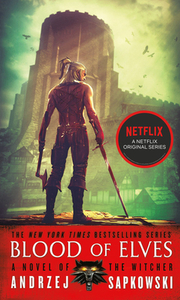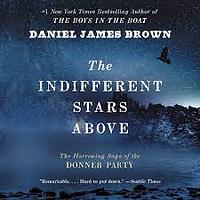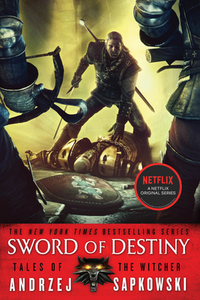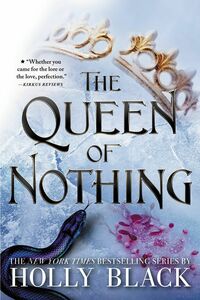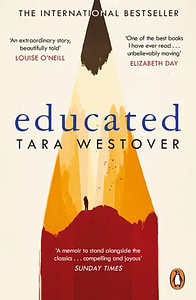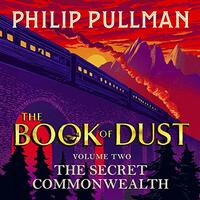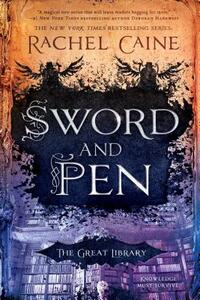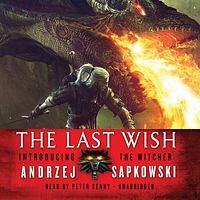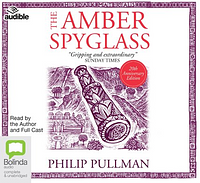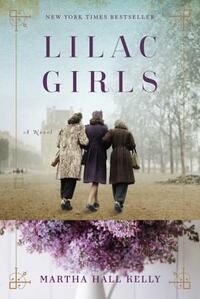Take a photo of a barcode or cover
theinquisitxor's Reviews (804)
3.75ish stars/
I've enjoyed this one the most so far of the series! I read this on audiobook, which was something new to me as I have not listened to an audiobook in quite sometime. It took a bit to adjust to the narration and style just because audiobooks are not typically something I do. But once I got into it, I really enjoyed listening.
There were some parts of the book that I really liked. Ciri being at Kaer Morhen being trained by the Witchers was kind of adorable? She had all these badass monster hunting beings completely dumbfounded on how to raise a young girl. I also liked the ending quite a bit, with Ciri and Yennefer's relationship building and the two growing quite close. Netflix just released the characters promo videos which have me very excited for the show. I'm glad I've gotten through the short stories and the first novel before the show comes out so I have some understanding what what is all going on.
I won't be reading the next Witcher book until later in the month, but I am looking forward to it and to see what happens next!
I've enjoyed this one the most so far of the series! I read this on audiobook, which was something new to me as I have not listened to an audiobook in quite sometime. It took a bit to adjust to the narration and style just because audiobooks are not typically something I do. But once I got into it, I really enjoyed listening.
There were some parts of the book that I really liked. Ciri being at Kaer Morhen being trained by the Witchers was kind of adorable? She had all these badass monster hunting beings completely dumbfounded on how to raise a young girl. I also liked the ending quite a bit, with Ciri and Yennefer's relationship building and the two growing quite close. Netflix just released the characters promo videos which have me very excited for the show. I'm glad I've gotten through the short stories and the first novel before the show comes out so I have some understanding what what is all going on.
I won't be reading the next Witcher book until later in the month, but I am looking forward to it and to see what happens next!
Because we dare to hope- even when doing so might undo us- we leave the worlds we create behind us, swirling in our wakes, eternal and effervescent with the beauty of our aspirations."
Oh man this book makes me so so so glad to have 21st century technology and to know that I have air conditioning, heat, a fridge full of food and a car to transport me. I cannot even begin to fathom the difficulties of life for someone living on the frontier in the 1840s, but what the Donner Party went through is even more unfathomable. The crazy thing is that the rest of the Western world in the 1840s had the telegram, the industrial revolution, the Communist Manifesto was being written and NYC had a large part of the city planning it still has today. We go from a recognizable world of restaurants and universities to the Stone Age in the Sierra Nevadas. Some surviving members of the Donner Party even lived to the 1920s. These people saw WWI which just blows my mind. This feels so far in the past in my mind, that realizing that the last members of the party died about 100 years ago is almost inconceivable to me.
I had listened to a Podcast that covered the story of the Donner Party over the summer, and became interested in this book from that podcast. I found that I couldn't just sit and read large sections of this book at once. I would only read about a chapter at a time. Not because the book was poorly written (it is written exceptionally well), but because the topics are so heavy and dark I only wanted to read a little at a time. This might be the darkest and most brutal book I've ever read. I see everyone talking about 'grim-dark' and I raise you this book instead. The scariest part is that it is all true and that 80-some people struggled, starved and froze to death, while the other half that survived resorted to perhaps the biggest, more ingrained taboo humanity has.
Oh man this book makes me so so so glad to have 21st century technology and to know that I have air conditioning, heat, a fridge full of food and a car to transport me. I cannot even begin to fathom the difficulties of life for someone living on the frontier in the 1840s, but what the Donner Party went through is even more unfathomable. The crazy thing is that the rest of the Western world in the 1840s had the telegram, the industrial revolution, the Communist Manifesto was being written and NYC had a large part of the city planning it still has today. We go from a recognizable world of restaurants and universities to the Stone Age in the Sierra Nevadas. Some surviving members of the Donner Party even lived to the 1920s. These people saw WWI which just blows my mind. This feels so far in the past in my mind, that realizing that the last members of the party died about 100 years ago is almost inconceivable to me.
I had listened to a Podcast that covered the story of the Donner Party over the summer, and became interested in this book from that podcast. I found that I couldn't just sit and read large sections of this book at once. I would only read about a chapter at a time. Not because the book was poorly written (it is written exceptionally well), but because the topics are so heavy and dark I only wanted to read a little at a time. This might be the darkest and most brutal book I've ever read. I see everyone talking about 'grim-dark' and I raise you this book instead. The scariest part is that it is all true and that 80-some people struggled, starved and froze to death, while the other half that survived resorted to perhaps the biggest, more ingrained taboo humanity has.
3.5 stars/
I did enjoy this one more than the first. I think it may be because that I am already familiar with the world, the writing, and short story structure. This installment is more about Geralt's relationships with those he cares about, while the first was more about Geralt being a witcher. I enjoyed most of the stories, and I was really happy to finally meet Ciri and get told about the 'sword of destiny'.
I'm ready to get into the main storyline and read this series as a set of novels. I'm planning on reading Blood of Elves on audiobook because my local library doesn't have it. I also haven't listened to an audio book in years and I am looking forward to it. By reading it this way, I think I might get some of the humor and subtle things more on audio than reading a physical copy, and I think getting into the narration style of the audiobooks will help my enjoyment of the series as well. I want to finish Blood of Elves before the Netflix show starts, which I think is doable!
I did enjoy this one more than the first. I think it may be because that I am already familiar with the world, the writing, and short story structure. This installment is more about Geralt's relationships with those he cares about, while the first was more about Geralt being a witcher. I enjoyed most of the stories, and I was really happy to finally meet Ciri and get told about the 'sword of destiny'.
I'm ready to get into the main storyline and read this series as a set of novels. I'm planning on reading Blood of Elves on audiobook because my local library doesn't have it. I also haven't listened to an audio book in years and I am looking forward to it. By reading it this way, I think I might get some of the humor and subtle things more on audio than reading a physical copy, and I think getting into the narration style of the audiobooks will help my enjoyment of the series as well. I want to finish Blood of Elves before the Netflix show starts, which I think is doable!
Ahh I so wanted to give this 5 stars, but it didn't quite get there for me. It was still really good and a good conclusion and wrap-up for the trilogy, but I didn't love it quite as much as The Wicked King. That was a wicked good book, and this one was pretty good too. Like the two previous books, this is also very action packed, quick to read and full of twists and surprises.
Jude remains a favorite. She's a great character and continues to grow and develop as a master manipulator and ruler. Carden has always been a little 'eh' for me, and while I generally liked his character in this book, he's just never been my absolute favorite. I feel somewhat indifferent towards him. But there were many other characters that we get to see more of and learn more about which was really nice. Relationship dynamics played a big role in this book. My favorite has constantly been the Madoc and Jude relationship. They're just so complicated and filled with so much contempt for each other. Especially in the forest scene! That was probably my favorite part.
One thing that has come to my attention recently about books which are the last in a YA fantasy series is that the endings are not as climatic or have as much consequences as they should. I feel like this one teeters a tiny bit towards that. I felt like there could have been more bad things to happen, more deaths and big unforeseen twists (I did catch the big twist at the end before it happened which made me a little sad :( because I love being surprised by authors). Even if that bothered me a little bit, I still think this is a strong last book and really well done and I'm glad this series has been a part of my life the past few years!
Jude remains a favorite. She's a great character and continues to grow and develop as a master manipulator and ruler. Carden has always been a little 'eh' for me, and while I generally liked his character in this book, he's just never been my absolute favorite. I feel somewhat indifferent towards him. But there were many other characters that we get to see more of and learn more about which was really nice. Relationship dynamics played a big role in this book. My favorite has constantly been the Madoc and Jude relationship. They're just so complicated and filled with so much contempt for each other. Especially in the forest scene! That was probably my favorite part.
One thing that has come to my attention recently about books which are the last in a YA fantasy series is that the endings are not as climatic or have as much consequences as they should. I feel like this one teeters a tiny bit towards that. I felt like there could have been more bad things to happen, more deaths and big unforeseen twists (I did catch the big twist at the end before it happened which made me a little sad :( because I love being surprised by authors). Even if that bothered me a little bit, I still think this is a strong last book and really well done and I'm glad this series has been a part of my life the past few years!
“You can love someone and still choose to say goodbye to them,” she says now. “You can miss a person every day, and still be glad that they are no longer in your life.”
This reminded me a lot of The Glass Castle by Jeanette Walls. It's another memoir about growing up in a very unconventional childhood and how the author was able to leave the situation they were in and improve their lives. I can definitely tell that this book is designed to be a crowd pleasing read and while there are darker sections and graphic descriptions, I never felt wholly uncomfortable.
I read this for one of my English classes this semester, and we talked about the what the value of education is, how the public school system prepares you for college/your life and so on. I think the reason why this memoir (and many like it) become so popular is that more people than you may think are able to relate to the story, even just a tiny bit. I think its safe to say that most people in the US did not have a similar childhood to Tara, but maybe they had a parent with a mental illness, or a mean sibling, or they grew up in a toxic environment. Then there is the category of people (like me) that are just absolutely fascinated by the totally different lifestyle and are very curious about what it is like growing up so removed and fearful of society.
I especially liked the second half of the book better than the first. Once Tara gets to college, starts learning and changing her worldview was the best part in my opinion. I found her emotions and experiences both interesting and very emotional. Even though I knew the outcome, I was rooting for her and felt anxious and fearful for her future. Thank god for all the professors who helped her along and gave her good advice. Overall, I enjoyed reading this and I will probably pass it along to family to read as well.
This reminded me a lot of The Glass Castle by Jeanette Walls. It's another memoir about growing up in a very unconventional childhood and how the author was able to leave the situation they were in and improve their lives. I can definitely tell that this book is designed to be a crowd pleasing read and while there are darker sections and graphic descriptions, I never felt wholly uncomfortable.
I read this for one of my English classes this semester, and we talked about the what the value of education is, how the public school system prepares you for college/your life and so on. I think the reason why this memoir (and many like it) become so popular is that more people than you may think are able to relate to the story, even just a tiny bit. I think its safe to say that most people in the US did not have a similar childhood to Tara, but maybe they had a parent with a mental illness, or a mean sibling, or they grew up in a toxic environment. Then there is the category of people (like me) that are just absolutely fascinated by the totally different lifestyle and are very curious about what it is like growing up so removed and fearful of society.
I especially liked the second half of the book better than the first. Once Tara gets to college, starts learning and changing her worldview was the best part in my opinion. I found her emotions and experiences both interesting and very emotional. Even though I knew the outcome, I was rooting for her and felt anxious and fearful for her future. Thank god for all the professors who helped her along and gave her good advice. Overall, I enjoyed reading this and I will probably pass it along to family to read as well.
"You used to be optimistic. You used to think that whatever we did would turn out well. Even after we came back from the North, you used to think that. Now you're cautious, you're anxious... you're pessimistic."
She knew he was right, but it wasn't right that he should speak to her accusingly, as if it was something to blame her for.
"I used to be young," was all she could find to say.
He made no response.
Okay Mr. Pullman, you've done it again. You've broken my heart again and there's nothing to fix it except for the third book in this trilogy. This is the continuation of Lyra's journey about 10 years after the events of His Dark Materials. I've heard that this is a story for people who read HDM as children but are now reading The Book of Dust as adults. And I couldn't agree more. It deals with adult themes and while Pullman still has the effortless way of drawing the reader into Lyra's world, you must tread carefully in this story. Even thought HDM is one of the darker, more theme heavy children's/ya books, TSC takes it to a new level. It explores psychology, mental health, trauma, politics, espionage and lies.
This trilogy seems to be somewhat mirroring HDM in terms of construction. It's not until the second installment of the series that the central plot really kicks in. While The Golden Compass and La Belle Sauvage are crucial to their respective trilogies, Pullman writes so that the second books are where the full stakes and plot is revealed. He also ends both installments on a large cliffhanger. I'm assuming that the third book will be even longer and more broad than TSC (if that's even possible). This series definitely isn't His Dark Materials. It doesn't contain the same elements of magic or destiny, or angels and gods. It's more about politics and world changing schemes and intellectual ideas. And it's much more rooted in the physical, tangible world. Just keep your mind open while reading this that this series is different from HDM. That being said I'm going to get into many Spoilers so stop reading if you don't want to be spoiled!
*SPOILERS*
The Lyra of this book is not the same Lyra we fell in love with in HDM. This Lyra is 20 years old and she has many issues. The trauma of her childhood seems to have finally caught up with her, and has left her as a depressed, anxious, stressed college student. Her constant state of melancholy and slight depression is such a strong contrast with her confident, energetic, optimism of her childhood. But it's relatable. I feel like most twenty year olds feel at least a little like Lyra does at the beginning of this story. Where does all our energy and hopefulness go when we're 10/11/12 years old, compared to when we're 20/21/22?
She has realized how unsure her future is, how utterly alone and traumatized she has been left. This book is an interesting look into the mind of a heroine years after the original events took place. It's an interesting look into what events of HDM she thinks of more often, and what events she seems to have tried to forget. Her separation from Pan and time spent in the Land of the Dead seem to have stuck with her well. So had her last few days with Will. Other events she seems to have tried to forget. The battle between the forces of 'God' and Lord Asriel, as well as times where she and Will would just travel through random worlds does not seem like memories she visits too often. Which I find interesting, especially how Lyra has seemed to give up on the fantastical and magical elements at the beginning.
Her changed relationship with Pan was heartbreaking. But Lyra had changed so much as a person, that a fractured relationship with her literal soul was bound to happen. She had basically turned into someone unrecognizable to Pan (which was none of her fault) but they both needed to figure themselves out in this story. Again, the cliffhanger leaves a lot to wonder, but I'm hoping for the best.
And Will... Lyra still has not gotten over Will. A part of me hopes, hopes that they will somehow find each other again and be together. I know the chances are almost nonexistent, but I also really loved Will as a character, and I want to know how and what he is doing. Even if they never see each other again, I want to know if he's alright. A small part of me hopes that there is something in that desert, that can lead Lyra back into Will's (our) world. I know HDM is about making the Republic of Heaven where you are, and living a good life because nothing else is guaranteed. Which is something Lyra has kind of forgotten, and I hope Pullman bring it back up again? The lines Lyra says about Will, "I think about him every day. Probably every hour. He's still the center of my life" just hurt so much.
I love some of the social issues, and how they they parallel the social issues of our world. It makes sense that issues would be at least vaguely similar, since they are parallel worlds. The fleeing of refugees out of the Middle East, governments trying to subtly pass laws that infringe upon freedoms, new thoughts, radical movements and shootings. All of these parallel current issues in our world.
I also liked Lyra's journey in this book. It was much more of a journey she takes alone. Even though she has many people to help her on her way towards the Middle East and Asia, it is a fundamentally solitary journey, and a great metaphor for your time as a young adult just trying to find your way around in the world. While in the original series, she is going North (and Northern lands will always have a soft spot in me) I really like the way she is journeying into the East this time.
I hope some of the themes and results of HDM finds its way into the third installment. The concept of the Republic of Heaven, free will and no divine authority would be so interesting to explore as a consequence, but for most of the book we get a depressed, confused and scared Lyra. Which is fine, horrible things happened to her, and it's understandable why she is like the way she is. I just feel like the big cosmic battle at the end of The Amber Spyglass and the changes that happened to the universe are not as consequential as they should have been.
My main complaint is: Why does the Magisterium still exist in Lyra's word? In TAS, there is a line at the end about how the Magisterium feel apart a bit and became chaotic. It just doesn't make much sense that in a world where the Authority was defeated, how does an institution like the Magisterium still have so much power? I thought that one of the main purpose of the original trilogy was to bring about the end of such a oppressive regime. But here we are 10 years later with the same organization having even more power than ever before.
I like Lyra having a villain at her age. Oliver Bonneville is like Will's antithesis, and their future interactions are sure to be interesting. I'm not sure how I feel about Oliver, and I look forward to seeing him more in the third book. There are a lot of other characters previously introduced, Malcom, Alice, Hannah, Coram and so many more (it was a little hard to keep track of everyone) and seeing them all finally together and in each others' confidence was nice. Malcom's feelings towards Lyra are a little 'ew' and I sincerely hope nothing becomes of it. I was a little uncomfortable and I hope, hope Pullman does not make it a romantic relationship. Even though they are both adults, there is still too much of an age gap in my opinion. (the only person Lyra should be with is Will)
I'm interested in how the Roses relate to Dust and the previous events of Lyra's life. This book was an emotional rollercoaster and while it's definitely not perfect, I can't wait for the last one. HDM is not perfect, and there are parts/ elements I don't enjoy that much, but this story and world that Philip Pullman has crafted has become one of my favorites. I have only grown to love the characters and world and magic even more as I've gotten older. I have high expectations for the third installment, and I hope we at least get a title soon!
She knew he was right, but it wasn't right that he should speak to her accusingly, as if it was something to blame her for.
"I used to be young," was all she could find to say.
He made no response.
Okay Mr. Pullman, you've done it again. You've broken my heart again and there's nothing to fix it except for the third book in this trilogy. This is the continuation of Lyra's journey about 10 years after the events of His Dark Materials. I've heard that this is a story for people who read HDM as children but are now reading The Book of Dust as adults. And I couldn't agree more. It deals with adult themes and while Pullman still has the effortless way of drawing the reader into Lyra's world, you must tread carefully in this story. Even thought HDM is one of the darker, more theme heavy children's/ya books, TSC takes it to a new level. It explores psychology, mental health, trauma, politics, espionage and lies.
This trilogy seems to be somewhat mirroring HDM in terms of construction. It's not until the second installment of the series that the central plot really kicks in. While The Golden Compass and La Belle Sauvage are crucial to their respective trilogies, Pullman writes so that the second books are where the full stakes and plot is revealed. He also ends both installments on a large cliffhanger. I'm assuming that the third book will be even longer and more broad than TSC (if that's even possible). This series definitely isn't His Dark Materials. It doesn't contain the same elements of magic or destiny, or angels and gods. It's more about politics and world changing schemes and intellectual ideas. And it's much more rooted in the physical, tangible world. Just keep your mind open while reading this that this series is different from HDM. That being said I'm going to get into many Spoilers so stop reading if you don't want to be spoiled!
*SPOILERS*
The Lyra of this book is not the same Lyra we fell in love with in HDM. This Lyra is 20 years old and she has many issues. The trauma of her childhood seems to have finally caught up with her, and has left her as a depressed, anxious, stressed college student. Her constant state of melancholy and slight depression is such a strong contrast with her confident, energetic, optimism of her childhood. But it's relatable. I feel like most twenty year olds feel at least a little like Lyra does at the beginning of this story. Where does all our energy and hopefulness go when we're 10/11/12 years old, compared to when we're 20/21/22?
She has realized how unsure her future is, how utterly alone and traumatized she has been left. This book is an interesting look into the mind of a heroine years after the original events took place. It's an interesting look into what events of HDM she thinks of more often, and what events she seems to have tried to forget. Her separation from Pan and time spent in the Land of the Dead seem to have stuck with her well. So had her last few days with Will. Other events she seems to have tried to forget. The battle between the forces of 'God' and Lord Asriel, as well as times where she and Will would just travel through random worlds does not seem like memories she visits too often. Which I find interesting, especially how Lyra has seemed to give up on the fantastical and magical elements at the beginning.
Her changed relationship with Pan was heartbreaking. But Lyra had changed so much as a person, that a fractured relationship with her literal soul was bound to happen. She had basically turned into someone unrecognizable to Pan (which was none of her fault) but they both needed to figure themselves out in this story. Again, the cliffhanger leaves a lot to wonder, but I'm hoping for the best.
And Will... Lyra still has not gotten over Will. A part of me hopes, hopes that they will somehow find each other again and be together. I know the chances are almost nonexistent, but I also really loved Will as a character, and I want to know how and what he is doing. Even if they never see each other again, I want to know if he's alright. A small part of me hopes that there is something in that desert, that can lead Lyra back into Will's (our) world. I know HDM is about making the Republic of Heaven where you are, and living a good life because nothing else is guaranteed. Which is something Lyra has kind of forgotten, and I hope Pullman bring it back up again? The lines Lyra says about Will, "I think about him every day. Probably every hour. He's still the center of my life" just hurt so much.
I love some of the social issues, and how they they parallel the social issues of our world. It makes sense that issues would be at least vaguely similar, since they are parallel worlds. The fleeing of refugees out of the Middle East, governments trying to subtly pass laws that infringe upon freedoms, new thoughts, radical movements and shootings. All of these parallel current issues in our world.
I also liked Lyra's journey in this book. It was much more of a journey she takes alone. Even though she has many people to help her on her way towards the Middle East and Asia, it is a fundamentally solitary journey, and a great metaphor for your time as a young adult just trying to find your way around in the world. While in the original series, she is going North (and Northern lands will always have a soft spot in me) I really like the way she is journeying into the East this time.
I hope some of the themes and results of HDM finds its way into the third installment. The concept of the Republic of Heaven, free will and no divine authority would be so interesting to explore as a consequence, but for most of the book we get a depressed, confused and scared Lyra. Which is fine, horrible things happened to her, and it's understandable why she is like the way she is. I just feel like the big cosmic battle at the end of The Amber Spyglass and the changes that happened to the universe are not as consequential as they should have been.
My main complaint is: Why does the Magisterium still exist in Lyra's word? In TAS, there is a line at the end about how the Magisterium feel apart a bit and became chaotic. It just doesn't make much sense that in a world where the Authority was defeated, how does an institution like the Magisterium still have so much power? I thought that one of the main purpose of the original trilogy was to bring about the end of such a oppressive regime. But here we are 10 years later with the same organization having even more power than ever before.
I like Lyra having a villain at her age. Oliver Bonneville is like Will's antithesis, and their future interactions are sure to be interesting. I'm not sure how I feel about Oliver, and I look forward to seeing him more in the third book. There are a lot of other characters previously introduced, Malcom, Alice, Hannah, Coram and so many more (it was a little hard to keep track of everyone) and seeing them all finally together and in each others' confidence was nice. Malcom's feelings towards Lyra are a little 'ew' and I sincerely hope nothing becomes of it. I was a little uncomfortable and I hope, hope Pullman does not make it a romantic relationship. Even though they are both adults, there is still too much of an age gap in my opinion.
I'm interested in how the Roses relate to Dust and the previous events of Lyra's life. This book was an emotional rollercoaster and while it's definitely not perfect, I can't wait for the last one. HDM is not perfect, and there are parts/ elements I don't enjoy that much, but this story and world that Philip Pullman has crafted has become one of my favorites. I have only grown to love the characters and world and magic even more as I've gotten older. I have high expectations for the third installment, and I hope we at least get a title soon!
3.5 stars/5
This has been a series I've read over the course of a year. I've really enjoyed it and found it to be a good bit of good ya fantasy fun. I read the first four books in the span of several months, and then waited (about 6 months) for the release of this last book. The first book, Smoke and Bone, was probably the strongest and best of the series, but the rest of the books have held up well and been enjoyable reads. I think the world building and characters are the two best parts of the series.
The concept of a world in which the Library of Alexandra never burned down and how our world would look different is fascinating. Even though there are the same counties and borders as today, the political dynamics and relationships between countries and the Library is so cool and unlike anything else I've ever read. The characters are also special. There is such a diversified cast of characters that is very refreshing.
I also thought that this was a good ending for the series. It's not a super long book, and there is a lot that happens in a short amount of time. I felt like the stakes were appropriate and the character's handling and dealing with the stakes was good. It's still a general happy ending and a good wrap up to the series. The reason why I gave it 3.5 stars is that because there was about a six month gap between reading, I felt a disconnect and a bit of a general lack of interest. If I read the series all at once I probably would have enjoyed this last book more, but reading it now after so many months felt a little off.
Either way, I'm glad I read this series, I've really enjoyed the books and it will be a series I'll be recommending in the future!
This has been a series I've read over the course of a year. I've really enjoyed it and found it to be a good bit of good ya fantasy fun. I read the first four books in the span of several months, and then waited (about 6 months) for the release of this last book. The first book, Smoke and Bone, was probably the strongest and best of the series, but the rest of the books have held up well and been enjoyable reads. I think the world building and characters are the two best parts of the series.
The concept of a world in which the Library of Alexandra never burned down and how our world would look different is fascinating. Even though there are the same counties and borders as today, the political dynamics and relationships between countries and the Library is so cool and unlike anything else I've ever read. The characters are also special. There is such a diversified cast of characters that is very refreshing.
I also thought that this was a good ending for the series. It's not a super long book, and there is a lot that happens in a short amount of time. I felt like the stakes were appropriate and the character's handling and dealing with the stakes was good. It's still a general happy ending and a good wrap up to the series. The reason why I gave it 3.5 stars is that because there was about a six month gap between reading, I felt a disconnect and a bit of a general lack of interest. If I read the series all at once I probably would have enjoyed this last book more, but reading it now after so many months felt a little off.
Either way, I'm glad I read this series, I've really enjoyed the books and it will be a series I'll be recommending in the future!
3.5-4ish stars
I started this on a complete whim. I'm looking forward to the Netflix show, and I've see a lot of positive reviews on The Witcher series all over. I wasn't really planning on reading the series right now, but I kinda just decided to start reading The Last Wish? I knew a little bit about the basic premise of the plot and books, so it didn't take me too long to get into the story and world.
I enjoyed the world building immensely. This Slavic fantasy world was really well done, and I immediately felt a strong connection to it. Of course, I can't pronounce half the the names and places in the series, but that's okay. I understand that this series is a fantasy world based off a different language and culture.
As for characters, I didn't make a very strong connection to any of them yet, and that might be just because of this was a collection of short stories. Geralt is cool. And I can see what makes him such a popular, well loved character, but I'm just not super into him yet. Hopefully that will happen in the next books. I liked Nenneke quite a bit. Yennifer I'm not so sure about yet. But I have hopes that I will get to know and like these characters much better.
I enjoyed the short story element much more than I thought I would. The dark fairy tale retellings were a pleasant surprise. I really liked the twisted take on popular children's fairy tales. It's no secret I like this element in books and stories I read. I think the short stories did a good job of introducing the characters and world without making things too confusing, while still leaving things left unanswered and leaving you curious for more.
I also think that this story encompassed some older fantasy elements into a 21st century fantasy novel. Geralt kinda feels like an older fantasy character to me. Event the monster element seemed a bit more like a classic fantasy element. Another nod to (possibly lotr?) is the idea that the world is changing, that nature is changing and something irreversible is happening. The inclusion of dwarves and elves in the story isn't something necessarily new, but I look forward to seeing how these races are developed.
So why did I give this only 3.5-4 stars? I thought the story consisted of mostly dialogue, and not as much description as I would have liked. The language also felt a little off and not very well done at some points. This is probably a result of the book being translated, but I've read a lot of translated books that were much better done than this one. Hopefully it gets better as the series goes on. The writing's not bad, just mediocre in my opinion.
It is also painfully obvious that this book was written by a man. Breasts, hips and lips get more description than most anything else about a woman. This is just something that has bothered me more and more as I get older. "Determined, and as if impatient, she leaned over and touched his eyelids, cheeks, lips with the tips of her breasts." WTF is this?! Honestly, men! Just trying to think of the mechanics a woman physically doing this is awkward? Not to mention that either she must be really leaning far over, or she has some really low hanging breasts. I also have a lessening care for the concept of "its medieval times, so everyone must be suffering, because everything was horrible and bad then" I'm honestly over this concept. It's just an outdated view on the middle ages.
I do plan on continuing on with this series, reading the next collection of short stories, as well as the first novel. I'll continue on then if the series has more of my attention.
I started this on a complete whim. I'm looking forward to the Netflix show, and I've see a lot of positive reviews on The Witcher series all over. I wasn't really planning on reading the series right now, but I kinda just decided to start reading The Last Wish? I knew a little bit about the basic premise of the plot and books, so it didn't take me too long to get into the story and world.
I enjoyed the world building immensely. This Slavic fantasy world was really well done, and I immediately felt a strong connection to it. Of course, I can't pronounce half the the names and places in the series, but that's okay. I understand that this series is a fantasy world based off a different language and culture.
As for characters, I didn't make a very strong connection to any of them yet, and that might be just because of this was a collection of short stories. Geralt is cool. And I can see what makes him such a popular, well loved character, but I'm just not super into him yet. Hopefully that will happen in the next books. I liked Nenneke quite a bit. Yennifer I'm not so sure about yet. But I have hopes that I will get to know and like these characters much better.
I enjoyed the short story element much more than I thought I would. The dark fairy tale retellings were a pleasant surprise. I really liked the twisted take on popular children's fairy tales. It's no secret I like this element in books and stories I read. I think the short stories did a good job of introducing the characters and world without making things too confusing, while still leaving things left unanswered and leaving you curious for more.
I also think that this story encompassed some older fantasy elements into a 21st century fantasy novel. Geralt kinda feels like an older fantasy character to me. Event the monster element seemed a bit more like a classic fantasy element. Another nod to (possibly lotr?) is the idea that the world is changing, that nature is changing and something irreversible is happening. The inclusion of dwarves and elves in the story isn't something necessarily new, but I look forward to seeing how these races are developed.
So why did I give this only 3.5-4 stars? I thought the story consisted of mostly dialogue, and not as much description as I would have liked. The language also felt a little off and not very well done at some points. This is probably a result of the book being translated, but I've read a lot of translated books that were much better done than this one. Hopefully it gets better as the series goes on. The writing's not bad, just mediocre in my opinion.
It is also painfully obvious that this book was written by a man. Breasts, hips and lips get more description than most anything else about a woman. This is just something that has bothered me more and more as I get older. "Determined, and as if impatient, she leaned over and touched his eyelids, cheeks, lips with the tips of her breasts." WTF is this?! Honestly, men! Just trying to think of the mechanics a woman physically doing this is awkward? Not to mention that either she must be really leaning far over, or she has some really low hanging breasts. I also have a lessening care for the concept of "its medieval times, so everyone must be suffering, because everything was horrible and bad then" I'm honestly over this concept. It's just an outdated view on the middle ages.
I do plan on continuing on with this series, reading the next collection of short stories, as well as the first novel. I'll continue on then if the series has more of my attention.
"I will love you forever; whatever happens. Till I die and after I die, and when I find my way out of the land of the dead, I'll drift about forever, all my atoms, till I find you again..."
I honestly don't even know what to think about this book or series right now. Re-reading this was so good, and so heart-wrenching. I didn't remember almost anything (except the very ending) about the book from when I read this years ago, so reading this again was like reading this for the first time. Sure, there were some things I started to remember as I read, but for the most part, it was mostly all new. I still don't know how to formulate my thoughts on this book yet. The Golden Compass is fantastic, The Subtle Knife is good/okay and this last book is somewhere in-between. I'll give it a solid 4 - 4.5 stars for now.
The characters are what makes the book in my opinion. Lyra is probably one of the best literarily characters I have come across ever. And that's saying something. Will is another great character, and someone who I can relate to more. His quiet strength and steadfastness compared to Lyra's cunning and fire is a great combination for the two. Dr. Mary Malone becomes much more real, likable and understandable in this story. Even Mrs. Coulter gets a different side to her that we haven't ever seen before.
The beginning it its weakest part. Without Lyra's pov for the first quarter or so, and jumping around to all sorts of pov's and characters, the story doesn't feel as rooted in what makes it so good. Once we get Lyra and Will back together, and they become the primary pov again, the story strengthens.
The ending though. The ending ripped my heart out again and left me an emotional wreck. (Spoilers hidden)
Here are a few of my favorite scenes:
1. Will challenging Iorek to a fight: This is such a badass scene. A twelve year old boy standing up to the armored bear with the Subtle Knife, knowing that with the knife he is perhaps the most powerful and dangerous being in the (multi)universe. When Iorek examines the knife and admits that he cannot fight Will because he would lose is such a chilling scene.
2. The Knife breaking and re-forging the Knife: I think I audibly gasped when the Knife broke, because it can cut through anything, so when it shattered the whole dichotomy of the story shifts. The part with Iorek warning Will that the Knife has a motive of its own was also super interesting and plays out into the very end of the book.
3. Mary and the Mulfa's: The scenes with Mary and the Mulfa people are so interesting in what a different life form would look like. I remember not liking these parts when I first read the book years ago, but now I have a definite appreciation for them.
4. Lyra and Will in the Land of the Dead: This was such a chilling part. To see what happens to people when they die, and to know that there isn't some eternal paradise waiting. The children having the leave their daemons behind because their souls couldn't travel into the underworld is also something very unsettling. This is another section that I got more out of reading a second time as an adult. The concept of us returning back to the world and our atoms becoming again part of nature was almost comforting and reassuring.
The main thing I don't quite understand as much as I would like is the War between Lord Asriel and the Authority (actually Metatron). I understand this story as a Paradise Lost retelling, but some parts are still vague in my mind. How did Asriel amass such a large army in such a short amount of time? Why did all these beings choose to follow him? What was the aftermath of the battle? This whole cosmic struggle between the Kingdom of Heaven and Asriel is something that could have been explained a bit more? Maybe I'm just missing something, and I'll look some of stuff up to help answer my questions later.
I know people get upset with the anti-Religion aspects of the story, but I think there are so many other morals and good lessons told. Themes of love and friendship, bravery, sacrifice and making the most of your life while you are alive. I'm glad to have finished the series before the hbo/bbc show starts, and now I can start The Secret Commonwealth. After reading the end of The Amber Spyglass again, I really want to start TSC soon to stay with Lyra and Pan. And even after finishing this series again there is still some small part of me that hopes the Pullman will reunite Will and Lyra again in The Book of Dust.
I honestly don't even know what to think about this book or series right now. Re-reading this was so good, and so heart-wrenching. I didn't remember almost anything (except the very ending) about the book from when I read this years ago, so reading this again was like reading this for the first time. Sure, there were some things I started to remember as I read, but for the most part, it was mostly all new. I still don't know how to formulate my thoughts on this book yet. The Golden Compass is fantastic, The Subtle Knife is good/okay and this last book is somewhere in-between. I'll give it a solid 4 - 4.5 stars for now.
The characters are what makes the book in my opinion. Lyra is probably one of the best literarily characters I have come across ever. And that's saying something. Will is another great character, and someone who I can relate to more. His quiet strength and steadfastness compared to Lyra's cunning and fire is a great combination for the two. Dr. Mary Malone becomes much more real, likable and understandable in this story. Even Mrs. Coulter gets a different side to her that we haven't ever seen before.
The beginning it its weakest part. Without Lyra's pov for the first quarter or so, and jumping around to all sorts of pov's and characters, the story doesn't feel as rooted in what makes it so good. Once we get Lyra and Will back together, and they become the primary pov again, the story strengthens.
The ending though. The ending ripped my heart out again and left me an emotional wreck. (Spoilers hidden)
Spoiler
When the two finally realize how much they love each other, just to be left in separate worlds without the possibility of each other again is the worst. The last quarter or so of the book is the best part, and makes up for the beginning so much.Here are a few of my favorite scenes:
1. Will challenging Iorek to a fight: This is such a badass scene. A twelve year old boy standing up to the armored bear with the Subtle Knife, knowing that with the knife he is perhaps the most powerful and dangerous being in the (multi)universe. When Iorek examines the knife and admits that he cannot fight Will because he would lose is such a chilling scene.
2. The Knife breaking and re-forging the Knife: I think I audibly gasped when the Knife broke, because it can cut through anything, so when it shattered the whole dichotomy of the story shifts. The part with Iorek warning Will that the Knife has a motive of its own was also super interesting and plays out into the very end of the book.
3. Mary and the Mulfa's: The scenes with Mary and the Mulfa people are so interesting in what a different life form would look like. I remember not liking these parts when I first read the book years ago, but now I have a definite appreciation for them.
4. Lyra and Will in the Land of the Dead: This was such a chilling part. To see what happens to people when they die, and to know that there isn't some eternal paradise waiting. The children having the leave their daemons behind because their souls couldn't travel into the underworld is also something very unsettling. This is another section that I got more out of reading a second time as an adult. The concept of us returning back to the world and our atoms becoming again part of nature was almost comforting and reassuring.
The main thing I don't quite understand as much as I would like is the War between Lord Asriel and the Authority (actually Metatron). I understand this story as a Paradise Lost retelling, but some parts are still vague in my mind. How did Asriel amass such a large army in such a short amount of time? Why did all these beings choose to follow him? What was the aftermath of the battle? This whole cosmic struggle between the Kingdom of Heaven and Asriel is something that could have been explained a bit more? Maybe I'm just missing something, and I'll look some of stuff up to help answer my questions later.
I know people get upset with the anti-Religion aspects of the story, but I think there are so many other morals and good lessons told. Themes of love and friendship, bravery, sacrifice and making the most of your life while you are alive. I'm glad to have finished the series before the hbo/bbc show starts, and now I can start The Secret Commonwealth. After reading the end of The Amber Spyglass again, I really want to start TSC soon to stay with Lyra and Pan. And even after finishing this series again there is still some small part of me that hopes the Pullman will reunite Will and Lyra again in The Book of Dust.
3.5 stars/
This was a good story about 3 women during WWII and the struggles they faced and how they are all interconnected with each other. We follow Caroline, a New York Socialite and philanthropist who aids in the war effort. Then there is Kasia, a Polish teenager who gets sent to Ravensbrück along with her sister and mother. These Polish women were used for medical experiments, by out third point of view, Herta. The women became known as The Rabbits, and this is their story of how they survived and death with their trauma.
Caroline eventually becomes a patron and helps The Rabbits (post-Ravensbrück) and they also try to bring justice to Herta, the Nazi doctor who preformed the surgeries. I never knew about The Rabbits, so reading this taught me some history I had never heard of before. I also liked the POVs, as it's not often you get POVs of a NY Socialite or a Nazi doctor. It made this book refreshing and different from many other WWII books. Despite this, I never felt that emotionally invested in the characters and plot. This may come from the fact that I was only reading about 70 pages per week (for Book Club) and never actually got fully invested in the story. There were specific scenes that I felt emotionally invested in, but just not the book as a whole. I basically finished it to finish it, not because I couldn't put it down.
It's still a good book and a good story, and written very well, just not the most emotionally compelling for me.
This was a good story about 3 women during WWII and the struggles they faced and how they are all interconnected with each other. We follow Caroline, a New York Socialite and philanthropist who aids in the war effort. Then there is Kasia, a Polish teenager who gets sent to Ravensbrück along with her sister and mother. These Polish women were used for medical experiments, by out third point of view, Herta. The women became known as The Rabbits, and this is their story of how they survived and death with their trauma.
Caroline eventually becomes a patron and helps The Rabbits (post-Ravensbrück) and they also try to bring justice to Herta, the Nazi doctor who preformed the surgeries. I never knew about The Rabbits, so reading this taught me some history I had never heard of before. I also liked the POVs, as it's not often you get POVs of a NY Socialite or a Nazi doctor. It made this book refreshing and different from many other WWII books. Despite this, I never felt that emotionally invested in the characters and plot. This may come from the fact that I was only reading about 70 pages per week (for Book Club) and never actually got fully invested in the story. There were specific scenes that I felt emotionally invested in, but just not the book as a whole. I basically finished it to finish it, not because I couldn't put it down.
It's still a good book and a good story, and written very well, just not the most emotionally compelling for me.
